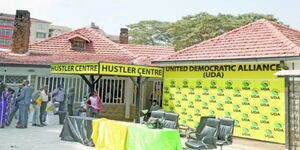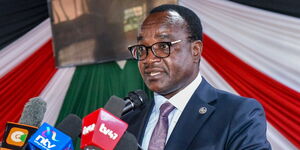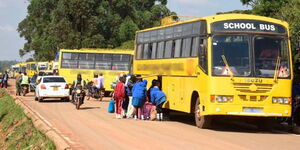Eight estates in Nairobi and Mombasa have so far registered 963 confirmed Covid-19 cases ever since Health CS Mutahi Kagwe announced the first positive case on March 12.
Ministry of Health data shows worst-hit Covid-19 estates, 2 located in Mombasa, Mvita and Likoni, while the other six namely: Kamukunji, Dagoretti, Embakasi, Lang'ata, Kibra and Makadara are located in the Kenyan capital, Nairobi.
By May 30, the distribution of the cases reads as follows; Mvita (240), Kibra (191), Kamukunji (115),Lang'ata (89), Embakasi area (88) Dagoretti area (84), Likoni (80), and Makadara (86).
Notably, Kibra registered a huge spike between May 28 and May 30, during which 105 new coronavirus cases were recorded.
There are various commonalities that can be identified among the estates that have recorded the highest Covid-19 cases, for example, Mvita in Mombasa has a population of an estimated 200,000 people (according to data from the Kenya National Bureau of Standards, 2018), yet the entire sub-county just spans 14.8 square kilometres as per the Independent Electoral and Boundaries data from 2016.
This points to a densely populated area, which could explain the staggering figures of confirmed cases arising from Mvita, as social distancing in such a tightly packed neighbourhood has proven to be a challenge.
"The high population in the area attributed to proximity to vital infrastructure such as roads, water, electricity and employment opportunities due to the presence of industries like the Export Processing Zones," reads an excerpt from Mombasa County Integrated Development Plan (2018-2022).
One of the locations in Mvita named Old Town, is currently under lockdown, with CS Kagwe issuing the containment order as part of measures to curb the spread of Covid-19, on May 6.
“The ministries of Health and Interior have directed that there should be a cessation of movement in the area known as Old Town in Mombasa," he decreed on the day, an order that has since been extended to June 6.
In Kibra, the high level of poverty and deplorable living conditions could arguably have contributed to the recent spike in coronavirus cases.
The slum area houses about 250,000 people making it one of the largest urban slums in Sub-Saharan Africa.
Worryingly, Kibra residents struggle to access water, with most forced to purchase whatever they can afford from vendors.
Proper sanitisation has been highlighted as one of the key ways to fight the virus, but without access to water, and living on less than a dollar a day, residents of such areas are left exposed.
Makadara sub-county which consists of 4 wards, Maringo/ Hamza, Viwandani, Harambee and Makongeni also has similar issues of a high population density and inadequate access to vital social amenities.
Another thing that stands out in the 8 Covid-19 hotspots in Kenya is that a huge percent of the population is not able to adhere to the measures issued by the national government to combat the pandemic because residents rely on a daily wage and cannot afford to stay home.
A phone-based survey carried out by the Population Council on May 5, in low-income settlement areas revealed that 79% had left the house; 37% left once, 24% left twice, 39% left three times or more.
Of those that left home, 34% travelled outside of the slum where they live, suggesting significant travel around Nairobi.
Speaking at State House, Nairobi, the president further laid out a raft of measures in his economic stimulus program including the government's plan to spend Ksh10 Billion on the Kazi Mtaani initiative, to engage youth in restoring public hygiene standards in urban civil works and other public undertakings.
"Many Kenyans cannot feed their families or pay their rent because of the Covid-19 pandemic, that's why the government has been dispatching a total of Ksh250 Million to vulnerable families," he stated during his speech.












